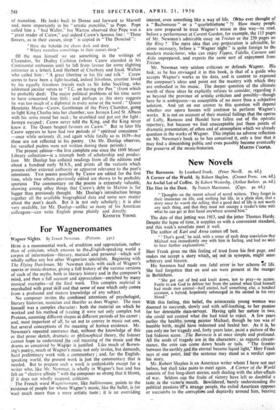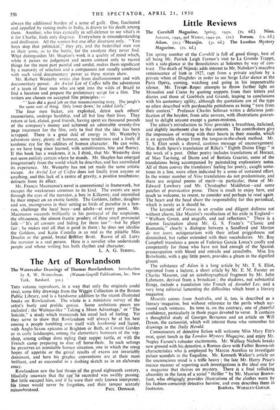New Novels
The Baroness. By Leonhard Frank. (Peter Neva 75. 6d.) "Thoughts on the recent school of novel writers. They forget in their insistence on life, and nothing but life, in a plain slice, that a story must be worth the telling, that a good deal of life is not worth any such thing, and that they must not occupy a reader's time with what he can get at first band anywhere around him."
The date of that jotting was 1913, and the jotter Thomas Hardy. Despite the lapse of time, it supplies us with a convenient standard, and this week's novelists meet it well.
The author of Karl and Anna comes off best.
"'That's good,' he said, with a sense of such deep conviction that Michael was immediately one with him in feeling, and had no wish to hear further explanations."
Herr Frank gives me this feeling of trust from his first page, and makes me accept a story which, set out in synopsis, might seem arbitrary and bizarre. •
His baroness had made one fatal error in her scheme of life. She had forgotten that ox and ass were present at the manger in Bethlehem.
" She got out of bed and knelt down, hot to pray—to accuse. Futile to ask God to deliver her from the animal when God himself had made men animal—half animal, half something else, a botched creature, a hybrid, hopelessly submerged in the animal in his very blood."
With this feeling, this belief, the aristocratic young woman was doomed to succunib, slowly and with self-loathing, to her passion for her detestable man-servapt. Having split her nature in two, she could not control what she had tried to reject. A few years earlier the healthy.young painter Michael, though he too was of humble birth, might have redeemed and healed her. As it is, he can only See her tragedy and, forty.rears later, paint a picture of the last hideous scene. The Baroness is at once simple and profound. All the seeds of tragedy are in the characters ; as regards circum- stance, the coin can come down heads or tails. " The frontier between the earthly and the eternal became liquid light," Herr Frank says at one point, and the sentence may stand as a verdict upon his story. Mr. Robert Shaplen is an Ainerican writer whotn I have not met before, but shall take pains to meet again. A Corner of the World consists of five long-short stories; each dealing with the after-effects of war. Seldom cap the fruits of victory have left so doubtful a taste in the victor's mouth. Bewildered,- barely understanding the political passions bra strange people, the exiled American opposes or succumbs to the corruption and depravity around him, bearing always the additional burden of a sense of guilt. One, fascinated and appalled by rioting mobs in India, is drawn to his death among them. Another, who tries cynically in self-defence to see what's in it for Charlie, finds only disgrace. Everywhere is misunderstanding and disillusion. All the women but one offer diversion only. " You boys stop that politickin'' " they cry, and the bedevilled men run to their arms, as to the bottle, for the anodyne they never find. What distinguishes Mr. Shaplen's work is a quality of mind which, while it passes no judgement and seems content only to record things for the most part painful and sordid, makes them significant by a maturity of selection and a compassion not usually combined with such vivid documentary power as these stories show.
Mr. Robert Westerby writes also from disillusionment and with documentary power. An Awful Lot of Coffee tells the adventures of a team of four men who are sent into the wilds of Brazil to find a location and prepare the preliminary script for a film. The writers are chosen on accepted film principles:- " 'Sam did a good job on that mountaineering story. The jungle's the same sort of thing. Only lower down,' he added fairly."
The four men bicker, are exploited, detest each others' mannerisms, undergo hardship, and all but lose their lives. They return at last, elated, good friends, having spent six thousand pounds of the company's money and achieved an admirable seventy-five 'page treatment for the film, only to find that the idea has been scrapped. There is a great deal of energy in Mr. Westerby's adventure story, plenty of humour, some tenderness and a lively if (sardonic eye for the oddities of human character. He can write, as we have long since learned, with sensitiveness, bite and fluency. If this book has a weakness, it is, I think, that Mr. Westerby does not seem entirely certain where he stands. Mr. Shaplen has emerged imaginatively from the world which he describes, and has assimilated its experience. Mr. Westerby has not yet made the same artistic escape. An Awful Lot of Coffee does not finally trust anyone or anything, and this tack of a centre of gravity, a positive touchstone, detracts from its effect.
Mr. Francis Macmanus's novel is conventional in framework, but escapes the weaknesses common to its kind. The events are seen through the eyes of the narrator, a boy in Kilkenny, and intensified by their impact on an exotic family. The Goldens, father, daughter and son, incongruous in their setting as birds of paradise in a hen- run, challenge the local boys—and adults—at every point. Mr. Macmanus succeeds brilliantly in his portrayal of the suspicions, the obtuseness, the almost frantic prudery of these small provincial folk—" It's all corners and hiding for them too "—but he plays fair ; he makes real all that is good in them ; he does not idealise the Goldens, and Katie Costello is- as real as the pitiable Miss Dreelin or the genial, brutal Brither Brutt. Rarest of all. Larry the narrator is a real person. Here is a novelist who understands people and whose writing has both rhythm and character. L. A. G. STRONG.







































 Previous page
Previous page